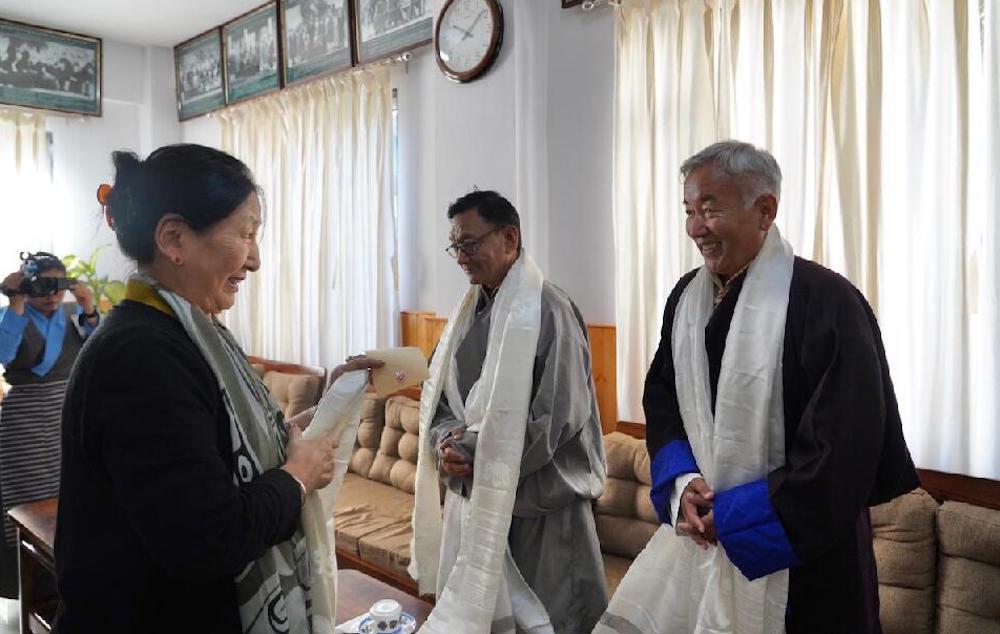Tsering Dhundup
DHARAMSHALA, Oct.7: The Central Tibetan Administrations swore in two key officials in a ceremony at the Tibetan parliament in Exile on Monday. Lobsang Yeshi, a former parliamentarian, was sworn in as the Commissioner of the Tibetan Election Commission, while Tsultrim Dorjee, Director of Tibetan Children Village (TCV), took oath as a member of the Public Service Commission.
The appointment was approved by the parliament during the final day of the 17th Tibetan Parliament-in-Exile’s 8th session. Yeshi secured a decisive victory with 29 votes against his competitor Lhalung Gyal’s 12 votes. In a separate election, Dorjee emerged successful with 24 votes, surpassing Thupten Yarphel who received 18 votes.
According to Article 97(2)(c) of the Charter of Tibetans in Exile, the Chief Election Commissioner and two Additional Election Commissioners must take an oath or affirmation before the Chief Justice of the Supreme Justice Commission, or in their absence, before the Speaker of the Parliament, as prescribed by law, before assuming office. Following this provision, Lobsang Yeshi took his oath as Chief Election Commissioner before the Speaker pf the TPiE.
Likewise, as per Article 101(3) of the Charter, which requires members of the Public Service Commission to take a similar oath, Tsultrim Dorjee took his oath as a member of the Public Service Commission before the house Speaker.
Lobsang Yeshi is a graduate of Punjab University, he has served in various capacities including as a teacher, researcher, and translator. His political career includes two terms in the Tibetan Parliament-in-Exile from 2011 to 2021, where he was an active member of the Standing Committee and Public Accounts Committee.
Tsultrim Dorjee, who fled Tibet in 1980 seeking educational opportunities, has devoted his career to education within the Tibetan exile community. A commerce graduate from St. Xavier’s College, Dorjee has served as a teacher, headmaster, and director at various TCV schools, most recently as the director of Upper TCV since 2017.
The Election Commission (EC) of the Tibetan Government-in-Exile is a permanent body led by the Chief Election Commissioner (CEC). The appointment process for the CEC involves a committee comprising the Supreme Justice Commissioner, the speaker and Deputy speaker of TPiE, and president, who compile a list of candidates (at least double the number of positions to be filled). The Parliament then votes on these candidates, with the highest vote-getter becoming CEC. When Parliament is not in session, the Standing Committee can conduct the election, requiring a two-thirds majority for appointment. During general elections, two Additional Election Commissioners are appointed following the same process, serving from the announcement of elections until the declaration of final results.
The EC holds authority in electoral matters, including the power to resolve disputes between Regional Election Offices and handle direct appeals. During general elections, the EC can prevent the transfer of Regional Election Officers (REOs) or EC staff by requesting the Kashag to cancel such transfers. Additionally, the EC is empowered to take disciplinary action against any REO or staff member who fails to fulfill their assigned electoral duties.
The Public Service Commission (PSC). Initially operating as the Service Management Office under the Home and Security Departments, the PSC’s role was limited to recruitment and basic training for CTA civil service staff. As the CTA expanded, this office was brought under the Kashag’s supervision and later became the independent Department of Personnel, with the entire CTA now functioning according to the Charter’s provisions.









